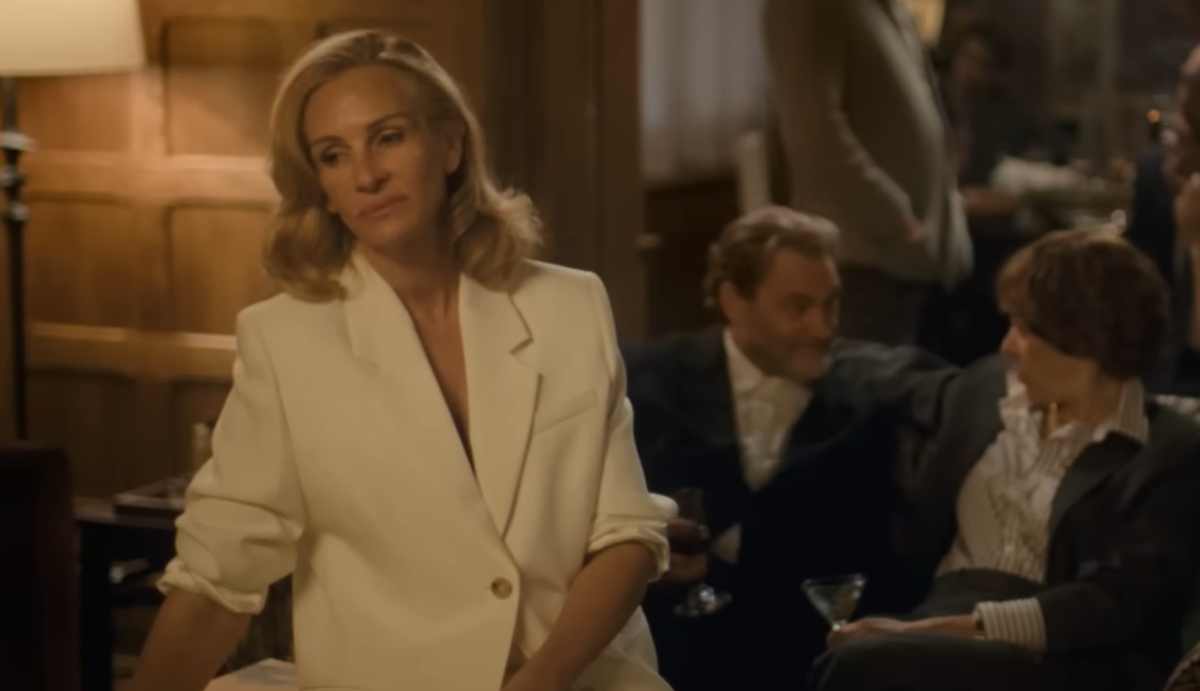Guadagnino tries to create a cohesive whole of a twisted academic landscape that hides sinister secrets, but is unable to fill the gaps in a thoroughly hollow script

Julia Roberts in ‘After The Hunt’. | Photo Credit: Prime Video/YouTube
There may come a time, years down the line, when the swooping political changes in the American social space may become easier to reconcile. Luca Guadagnino tries his hand at it in After the Hunt, but finds his directorial instincts grasping at an under-baked script. The result is an unimpressive and dull film.
Nora Garrett’s script opens at Yale’s Department of Philosophy, which is populated by the experienced and guarded Professor Alma Imhoff (Julia Roberts), her flirtatious junior Hank Gibson (Andrew Garfield), and Alma’s Ph.D. student Maggie (Ayo Edebiri). The stacked cast is introduced to the audience as a cozy group gathered around various sofas in Alma’s apartment, where they are attending a party.
The conversation broadly revolves around Arendt and Heidegger, while dipping slyly into the personal dynamics of the trio. Alma and Hank’s closeness to each other is made obvious, not only to the reader but also clocked by Alma’s therapist husband Frederik (Michael Stuhlbarg). He also notices that Maggie wants to achieve a similar kind of closeness with Alma.
The Ph.D. student, meanwhile, finds herself drawn to Alma’s secrets while also trying to avoid subtle advances from Hank. The next day, Maggie confides in Alma that Hank “crossed a line” and assaulted her after the party. When Hank later denies the charge, Alma finds herself in the middle of the muddled accusations.
The film expands from this point to put these characters into a web of accusations and non-accusations.
After the Hunt (English)
Guadagnino’s film attempts to curate a very specific universe. He attempts to transform Garrett’s script into a multi-elemental project that takes sonic and visual cues to move the story forward. The constant ticking of a clock, the camera that rotates around Alma – all these elements try to create a cohesive whole of a twisted academic landscape that hides sinister secrets. However, this is not enough to fill the gaps in a thoroughly hollow script.
After the Hunt spends most of its time chasing dialogues and conversations. It talks a lot about what it wants to show, but never quite gets around to materialising the tension into action. The film sets up the delicate interpersonal issues between the trio against the broader socio-political assumptions of the time, but fails to find a meaningful way to make the two interact.
These characters discuss power dynamics, accountability, their frustrations with “wokeness”, and the entitlement of the new crop of the privileged. Though it becomes increasingly clear that Garrett’s characters want to speak for the sake of registering their attendance in the script. Ultimately, the film becomes a conversation piece about conversations.
Roberts, Garfield, and Edebiri deliver the best they can with the material at hand, but often struggle against the limited range of possibilities the script affords them.
After the Hunt, filmed in 2024 and released this year, emerges as a film that is both behind and ahead of its times. It is blunt enough to have been a success a decade back. That , if you add just enough sharpness, it could have potentially been a passable commentary on campus politics. In its present form and circumstances, it is a tame statement whose dissatisfaction with itself becomes its most prominent feature.
After the Hunt is available for streaming on Prime Video
